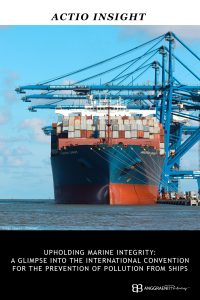The International Maritime Organization (IMO) has been at the forefront of ensuring that maritime activities are conducted within a framework that minimizes environmental impact. A shining testament to this commitment is the International Convention for the Prevention of Pollution from Ships, widely known as MARPOL. Adopted on November 2, 1973, and further modified by a Protocol in 1978, MARPOL targets a significant reduction in pollution from ships, particularly focusing on oil, chemicals, harmful substances carried by sea, sewage, garbage, and emissions. As the maritime industry plays a vital role in global trade, it becomes imperative to curtail the potential environmental hazards associated with shipping activities to maintain a sustainable relationship between marine ecosystems and human endeavors.[1]
MARPOL comprises of six annexes, each addressing different types of ship-generated pollution including oil, noxious liquid substances, harmful substances carried by sea in packaged form, sewage, garbage, and air emissions.[2] By putting forth a comprehensive framework, MARPOL imposes stringent standards on ship design, equipment, and operation to mitigate pollution. Through these measures, MARPOL strives to minimize accidental discharges and operational pollution while promoting advancements in marine pollution response preparedness.[3] This structured approach not only helps in preserving marine biodiversity but also significantly contributes toward achieving the broader environmental sustainability goals set at both regional and global levels.[4]
Furthermore, the International Maritime Organization has continually revised and updated MARPOL to adapt to new challenges and technological advancements in the shipping industry. These revisions ensure that the framework remains robust and effective in mitigating pollution from ships.[5] The IMO’s continuous engagement with member states and industry stakeholders underscores its resolve to foster a culture of environmental responsibility within the maritime sector.[6] Through collaborative efforts, the IMO and its member states work diligently to ensure compliance with MARPOL’s provisions, thus enhancing the overall environmental integrity of marine ecosystems.[7]
The importance of the International Maritime Organization’s marine protection treaty cannot be overstated. By providing a structured approach to managing and reducing pollution from ships, MARPOL serves as a critical tool in ensuring the long-term sustainability of marine environments which are essential to global biodiversity and human survival. Moreover, MARPOL’s global influence helps in fostering a unified approach toward marine pollution management, underlining the crucial role that international cooperation plays in addressing environmental challenges. The collective endeavor in adhering to MARPOL’s guidelines not only epitomizes the global determination to protect marine ecosystems but also showcases the broader commitment to environmental sustainability.
REFERENCES
[1] International Maritime Organization,”MARPOL”. https://www.imo.org/en/KnowledgeCentre/ConferencesMeetings/Pages/Marpol.aspx. Accessed on 29 Septermber 2023.
[2] Ibid.
[3] Raunek,”MARPOL (The International Convention for Prevention of Marine Pollution For Ships): The Ultimate Guide”. https://www.marineinsight.com/maritime-law/marpol-convention-shipping/. Accessed on 29 September 2023
[4] OECD,”OECD Work in Support of a Sustainable Ocean”. https://www.oecd.org/environment/2022-OECD-work-in-support-of-a-sustainable-ocean.pdf. Accessed on 26 October 2023.
[5] Ibid.
[6] Ibid.
[7] Capt. Deepak Mantoju,” Analysis of MARPOL implementation based on port state control statistics”. https://www.tandfonline.com/doi/full/10.1080/25725084.2021.1965281. Accessed on 26 October 2023
DISCLAIMER:
This disclaimer applies to the publication of articles by Anggraeni and Partners. By accessing or reading any articles published by Anggraeni and Partners, you acknowledge and agree to the terms of this disclaimer:
No Legal Advice: The articles published by Anggraeni and Partners are for informational purposes only and do not constitute legal advice. The information provided in the articles is not intended to create an attorney-client relationship between Anggraeni and Partners and the reader. The articles should not be relied upon as a substitute for seeking professional legal advice. For specific legal advice tailored to your individual circumstances, please consult a qualified attorney.
Accuracy and Completeness: Anggraeni and Partners strive to ensure the accuracy and completeness of the information presented in the articles. However, we do not warrant or guarantee the accuracy, currency, or completeness of the information. Laws and legal interpretations may vary, and the information in the articles may not be applicable to your jurisdiction or specific situation. Therefore, Anggraeni and Partners disclaim any liability for any errors or omissions in the articles.
No Endorsement: Any references or mentions of third-party organizations, products, services, or websites in the articles are for informational purposes only and do not constitute an endorsement or recommendation by Anggraeni and Partners. We do not assume responsibility for the accuracy, quality, or reliability of any third-party information or services mentioned in the articles.
No Liability: Anggraeni and Partners, its partners, attorneys, employees, or affiliates shall not be liable for any direct, indirect, incidental, consequential, or special damages arising out of or in connection with the use of the articles or reliance on any information contained therein. This includes but is not limited to, loss of data, loss of profits, or damages resulting from the use or inability to use the articles.
No Attorney-Client Relationship: Reading or accessing the articles does not establish an attorney-client relationship between Anggraeni and Partners and the reader. The information provided in the articles is general in nature and may not be applicable to your specific legal situation. Any communication with Anggraeni and Partners through the articles or any contact form on the website does not create an attorney-client relationship or establish confidentiality.
By accessing or reading the articles, you acknowledge that you have read, understood, and agreed to this disclaimer. If you do not agree with any part of this disclaimer, please refrain from accessing or reading the articles published by Anggraeni and Partners.
For further information, please contact:
P: 6221. 7278 7678, 72795001
H: +62 811 8800 427
Anggraeni and Partners, an Indonesian law practice with a worldwide vision, provides comprehensive legal solutions using forward-thinking strategies. We help clients manage legal risk and resolve disputes on admiralty and maritime law, complicated energy and commercial issues, arbitration and litigation, tortious claims handling, and cyber tech law.
S.F. Anggraeni
Managing Partner
Reynalda Basya Ilyas
Senior Associate
Jericho Xafier Ralf
Junior Associate

